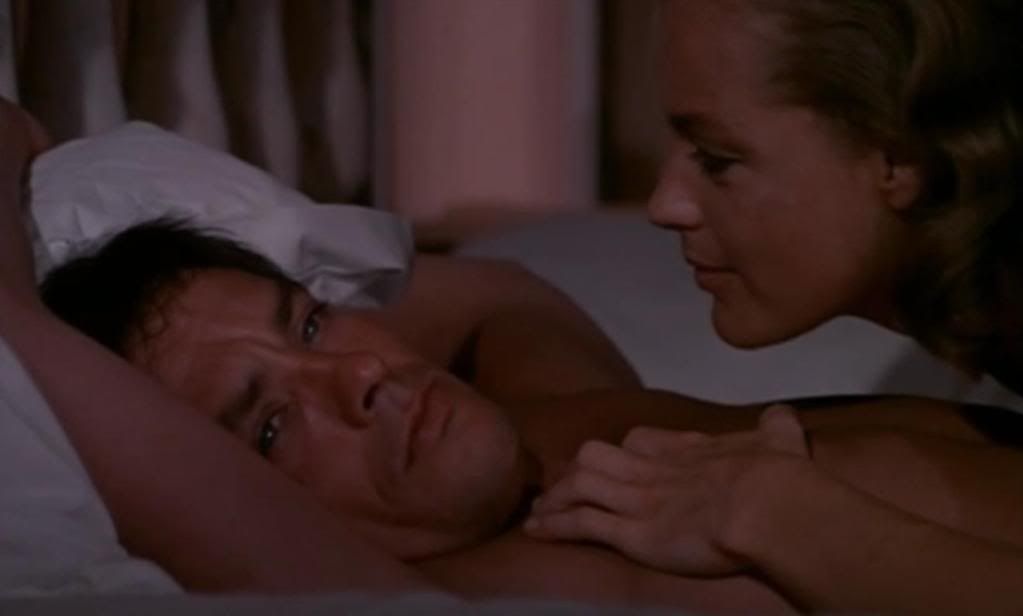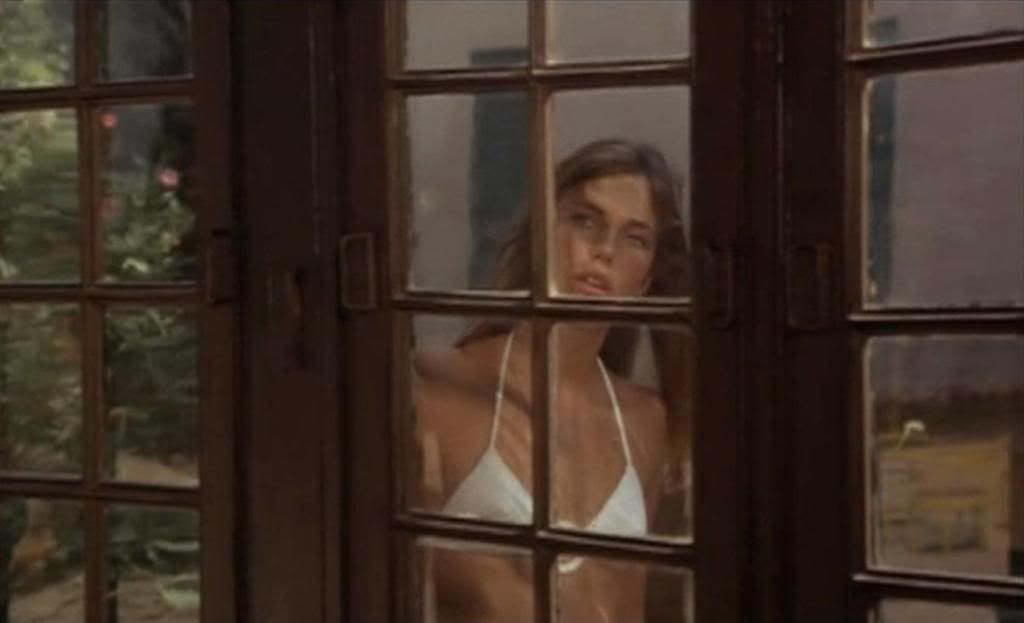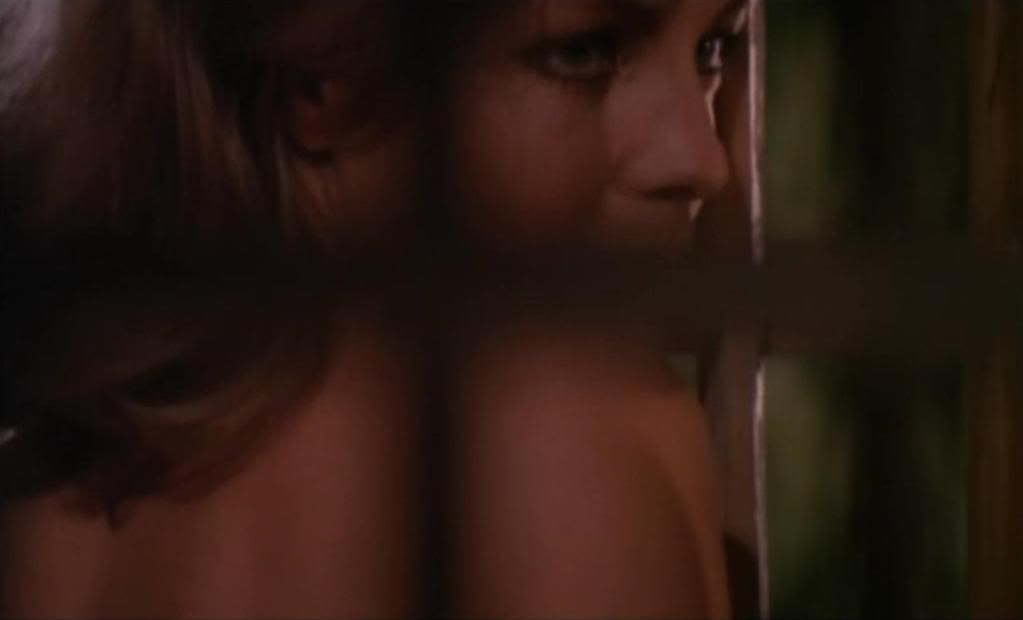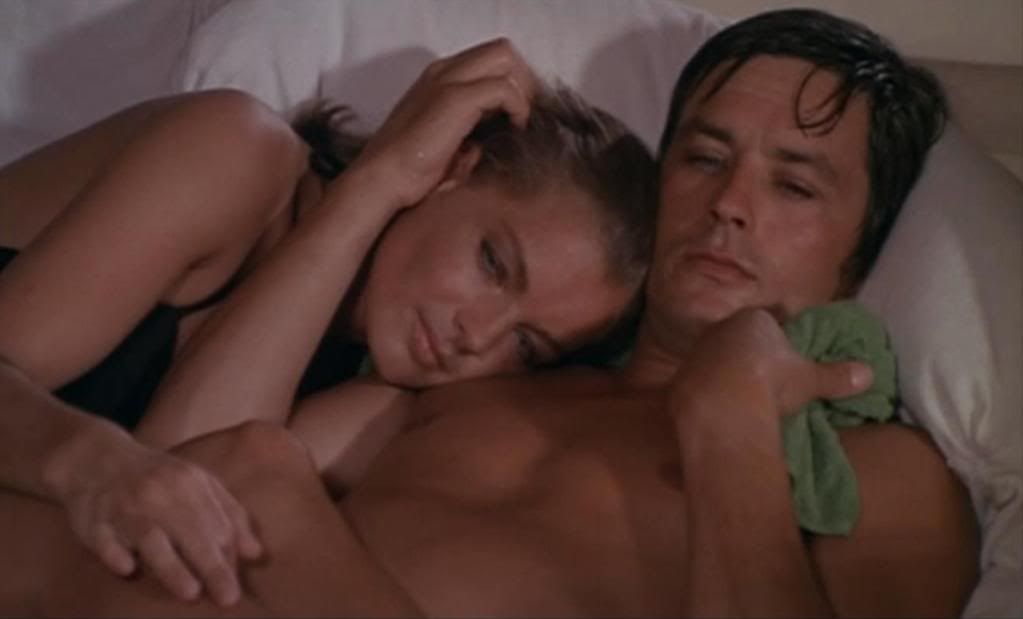

The Swimming Pool is an almost stereotypically French, stereotypically 1960s kind of movie. Directed by Jacques Deray, this languid thriller is centered around the titular pool at a Riviera villa where the settled, seemingly happy couple of Jean-Paul (Alain Delon) and Marianne (Romy Schneider) are spending a summer holiday. The film opens with an evocative, lazily sexy atmosphere of sun and water, the couple lounging their tanned bodies by the pool, wrestling poolside and passionately pawing and clawing one another. The film simmers and seethes with sex, Deray's camera sensuously drifting across the naked or near-naked bodies of the stars, capturing the clingy, sticky sensuality of these lazy summer days, their bodies warmed by the sun and sliding through the clear blue reflective water of the pool. The stars are beautiful, the scenery is beautiful, and the film has an almost savage, intense sexuality to it.
In the opening scenes, Marianne steps out of the water, sleek and dripping, and strolls around the pool to stand suggestively over Jean-Paul's reclining form, her legs slightly apart, her feet on either side of her head, so that he's staring up at her crotch. She then lays down with him and climbs on top of him, his hands scratching at her back, their bodies pressed tightly together. There's a desperate sexuality to their relationship, a raw physicality that's even more potently expressed in the somewhat later scene where Jean-Paul strips off Marianne's top and runs a tree branch across her bare skin, first gently and then whipping her with it like a lash, as though he's trying to both turn her on and to punish her, though for what it's not yet clear. When Marianne invites her former lover Harry (Maurice Ronet) and his daughter Penelope (Jane Birkin) to stay at the villa with them, the couple's seemingly happy, fulfilled relationship begins to strain, with Marianne's attraction to Harry rekindling while Jean-Paul finds his eye wandering to the coltish young body of Harry's daughter.
For a while, this simmering sexuality is enough, and the film gets by on the sexiness of its stars and the languidly beautiful imagery of their lazy summer idyll. Eventually, though, the film becomes slack, as lazy as its characters, content to set up this romantic and sexual tension without delving beyond the surface. Once Deray, working from a script co-written with Jean-Claude Carrière, sets up the basic premise of these criss-crossing desires and jealousies, the film stagnates, the tension simmering quietly but never really progressing beyond the charged exchange of glances and suggestive hints of infidelity. Even the violent climax is emotionally flat, and doesn't do nearly enough to shake up the characters.


That said, Deray provides some interest through the formal rigor with which he films this unfortunately static drama. This is a film in which nearly everything that happens can be boiled down to looks, glances, and Deray has a habit of honing in on the staring eyes of his protagonists, the camera slowly tracking in, the cuts drawing connections between one look and another. At one point, Penelope and Jean-Paul have been left alone at the villa while Marianne and Harry went out shopping together. Penelope finds Jean-Paul upstairs and stares nervously at his back, seemingly anticipating his seduction of her, and when he abruptly turns to face her, Deray captures him in closeup, his cool blue eyes taking her in, an unreadable expression on Delon's typically stoical face. At this point, Deray cuts away, not back to Penelope, but to Marianne, staring off into space, briefly distracted from her shopping by something, as though she could feel Jean-Paul's gaze, as though he were looking at her rather than the younger girl. The edit connects them even though they're apart, pairing off with others, starting to drift apart.
In another scene, later in the film, the camera tracks slowly across the couch where Jean-Paul and Penelope are sitting close together, watching a silent comedy on TV, and then begins crossing a gap that separates them from Marianne, sitting apart from them, the camera suddenly jumping and speeding up its movement as it approaches her to signify the disconnect between her and this newly forming couple. Deray also makes good use of window frames, which segment images of Penelope and Marianne in particular, the two women partioned behind glass, divided up by the games of jealousy and conquest that the men, former friends and rivals, seem to be playing here. The pool itself similarly distorts and reflects the action at the villa, creating wavery reflections in which everything is upside-down and elongated.
Deray's chilly, formally precise aesthetic makes for some striking, suggestive compositions, but one is still left with the impression that all this silent staring and affectless introspection doesn't add up to very much in the end. At its best, The Swimming Pool is sexy and sensuous, but its sexiness can only take it so far, and it's very difficult to locate the heart or the brain behind that sexy, fleshy surface.

2 comments:
This was a huge hit in France, and Delon has spoken of it having particular significance for him vis-a-vis his long term relationship with Romy Schneider.
I must agree with you here Ed. There are lush compositions and striking sensuality, but it's largely a vacuous piece, not to be confused with Ozon's captivating voyeurism in the far better film with the same name.
Wonderfully probing essay.
Post a Comment